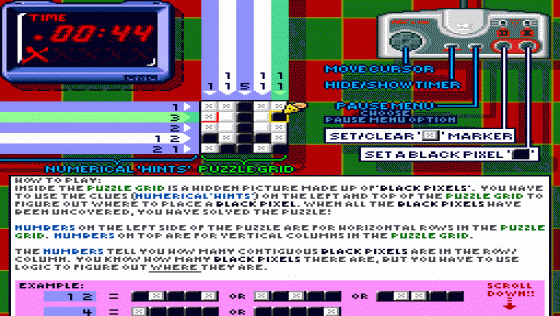
RGCD
 1st December 2007
1st December 2007
Categories: Review: Software
Author: James Monkman
Publisher: Chris Covell
Machine: NEC TurboGrafx-16/PC Engine
Published in RGCD #4
Tongueman's Logic
Originally previewed back in the first issue of RGCD, the final version of Tongueman's Logic was released back in October (coinciding with the 20th anniversary of the launch of the PC Engine) and I'm glad to announce that the finished product is a massive improvement over the original demo. Aside from still lacking a soundtrack, Chris Covell's PCE masterpiece now features 200 puzzles (ranging in size from 5x5 to 30x30 grids), a variety of new backdrop graphics, new visual effects (most notably on the level select screen) and newly incorporated automatic scrolling and adjustable scaling options.
For those of you new to RGCD, Tongueman's Logic is a Picross/Nongram game; it's similar to a crossword puzzle, but instead of words the goal is to identify and draw an image within the grid by logically deducting 'pixel' positions from the numerical clues (and a little guess work). Originally invented back around 1987, Picross soon became hugely popular in Japan and it wasn't long before Nintendo picked up on the puzzle fad, releasing two Picross games for the GameBoy and a staggering nine for the Super Famicom. Unfortunately for Nintendo, Picross didn't gain the same level of popularity outside Japan, and despite a heavy advertising campaign, Mario's Picross on the GameBoy sold poorly outside of its home market.
History lesson over, the question you probably want answering is whether the game is any good, and should you bother with installing an emulator to check it out? Well, if you find the idea of a professionally-designed logic game wrapped-up in some neat 16-bit visuals appealing, then yes; clearly though, you have to take into consideration that a game like Tongueman's Logic isn't going to be everyone's cup of tea.
A feature that I found particularly impressive for a homebrew release is the automatic rank saving; every time you complete a puzzle against the clock you are awarded with a score for your performance which is saved to the console's BRAM, effectively marking your progress through the game. The graphics and eye-candy are outstanding for a non-commercial release, and Chris' demo coding background shines through with his heavy use of copper bars, warping, animated bobs and other visual effects. Another noteworthy enhancement is that the automatic scrolling and tweaked scaling options now result in the larger puzzles being far more playable via emulation than in the previous build, finally making the game equally accessible to both real hardware and emulator users alike.
The only flaw in this otherwise excellent release is the lack of audio; Chris hasn't received any offers of assistance with supplying a suitable soundtrack or effects (despite his requests), so apart from a few ripped spot-effects the game is effectively mute. This is a real shame, because Tongueman's Logic fares incredibly well in all other areas. However, there may still be hope, as Chris has stated that he plans to return to the game after taking a deserved break with the goal of creating a CD version in the future.








